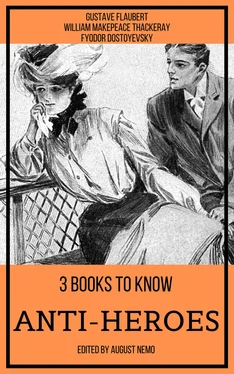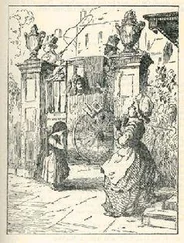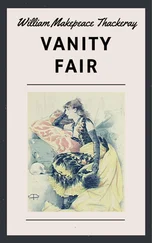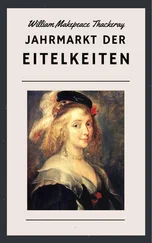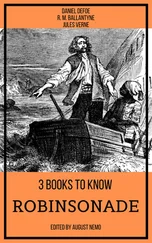This speech was not exactly true to the letter (for I had multiplied my pitched battles, my duels, and my wealth somewhat); but I saw that it made the impression I desired to effect upon the young gentleman’s mind, who listened to my statement with peculiar seriousness, and whom I presently left to digest it.
A couple of days afterwards I called to see him again, when I brought with me some of the letters that had passed between me and my Lady Lyndon. ‘Here,’ said I, ‘look—I show it you in confidence—it is a lock of her Ladyship’s hair; here are her letters signed Calista, and addressed to Eugenio. Here is a poem, “When Sol bedecks the mead with light, And pallid Cynthia sheds her ray,” addressed by her Ladyship to your humble servant.’
‘Calista! Eugenio! Sol bedecks the mead with light?’ cried the young lord. ‘Am I dreaming? Why, my dear Barry, the widow has sent me the very poem herself! “Rejoicing in the sunshine bright, Or musing in the evening grey.”’
I could not help laughing as he made the quotation. They were, in fact, the very words MY Calista had addressed to me. And we found, upon comparing letters, that whole passages of eloquence figured in the one correspondence which appeared in the other. See what it is to be a blue-stocking and have a love of letter-writing!
The young man put down the papers in great perturbation. ‘Well, thank Heaven!’ said he, after a pause of some duration,—‘thank Heaven for a good riddance! Ah, Mr. Barry, what a woman I MIGHT have married had these lucky papers not come in my way! I thought my Lady Lyndon had a heart, sir, I must confess, though not a very warm one; and that, at least, one could TRUST her. But marry her now! I would as lief send my servant into the street to get me a wife, as put up with such an Ephesian matron as that.’
‘My Lord George,’ said I, ‘you little know the world. Remember what a bad husband Lady Lyndon had, and don’t be astonished that she, on her side, should be indifferent. Nor has she, I will dare to wager, ever passed beyond the bounds of harmless gallantry, or sinned beyond the composing of a sonnet or a billet-doux.’
‘My wife,’ said the little lord, ‘shall write no sonnets or billets-doux; and I’m heartily glad to think I have obtained, in good time, a knowledge of the heartless vixen with whom I thought myself for a moment in love.’
The wounded young nobleman was either, as I have said, very young and green in matters of the world—for to suppose that a man would give up forty thousand a year, because, forsooth, the lady connected with it had written a few sentimental letters to a young fellow, is too absurd—or, as I am inclined to believe, he was glad of an excuse to quit the field altogether, being by no means anxious to meet the victorious sword of Redmond Barry a second time.
When the idea of Poynings’ danger, or the reproaches probably addressed by him to the widow regarding myself, had brought this exceedingly weak and feeble woman up to Dublin, as I expected, and my worthy Ulick had informed me of her arrival, I quitted my good mother, who was quite reconciled to me (indeed the duel had done that), and found the disconsolate Calista was in the habit of paying visits to the wounded swain; much to the annoyance, the servants told me, of that gentleman. The English are often absurdly high and haughty upon a point of punctilio; and, after his kinswoman’s conduct, Lord Poynings swore he would have no more to do with her.
I had this information from his Lordship’s gentleman; with whom, as I have said, I took particular care to be friends; nor was I denied admission by his porter, when I chose to call, as before.
Her Ladyship had most likely bribed that person, as I had; for she had found her way up, though denied admission; and, in fact, I had watched her from her own house to Lord George Poynings’ lodgings, and seen her descend from her chair there and enter, before I myself followed her. I proposed to await her quietly in the ante-room, to make a scene there, and reproach her with infidelity, if necessary; but matters were, as it happened, arranged much more conveniently for me; and walking, unannounced, into the outer room of his Lordship’s apartments, I had the felicity of hearing in the next chamber, of which the door was partially open, the voice of my Calista. She was in full cry, appealing to the poor patient, as he lay confined in his bed, and speaking in the most passionate manner. ‘What can lead you, George,’ she said, ‘to doubt of my faith? How can you break my heart by casting me off in this monstrous manner? Do you wish to drive your poor Calista to the grave? Well, well, I shall join there the dear departed angel.’
‘Who entered it three months since,’ said Lord George, with a sneer. ‘It’s a wonder you have survived so long.’
‘Don’t treat your poor Calista in this cruel cruel manner, Antonio!’ cried the widow.
‘Bah!’ said Lord George, ‘my wound is bad. My doctors forbid me much talk. Suppose your Antonio tired, my dear. Can’t you console yourself with somebody else?’
‘Heavens, Lord George! Antonio!’
‘Console yourself with Eugenio,’ said the young nobleman bitterly, and began ringing his bell; on which his valet, who was in an inner room, came out, and he bade him show her Ladyship downstairs.
Lady Lyndon issued from the room in the greatest flurry. She was dressed in deep weeds, with a veil over her face, and did not recognise the person waiting in the outer apartment. As she went down the stairs, I stepped lightly after her, and as her chairman opened her door, sprang forward, and took her hand to place her in the vehicle. ‘Dearest widow,’ said I, ‘his Lordship spoke correctly. Console yourself with Eugenio!’ She was too frightened even to scream, as her chairman carried her away. She was set down at her house, and you may be sure that I was at the chair-door, as before, to help her out.
‘Monstrous man!’ said she, ‘I desire you to leave me.’
‘Madam, it would be against my oath,’ replied I; ‘recollect the vow Eugenio sent to Calista.’
‘If you do not quit me, I will call for the domestics to turn you from the door.’
‘What! when I am come with my Calista’s letters in my pocket, to return them mayhap? You can soothe, madam, but you cannot frighten Redmond Barry.’
‘What is it you would have of me, sir?’ said the widow, rather agitated.
‘Let me come upstairs, and I will tell you all,’ I replied; and she condescended to give me her hand, and to permit me to lead her from her chair to her drawing-room.
When we were alone I opened my mind honourably to her.
‘Dearest madam,’ said I, ‘do not let your cruelty drive a desperate slave to fatal measures. I adore you. In former days you allowed me to whisper my passion to you unrestrained; at present you drive me from your door, leave my letters unanswered, and prefer another to me. My flesh and blood cannot bear such treatment. Look upon the punishment I have been obliged to inflict; tremble at that which I may be compelled to administer to that unfortunate young man: so sure as he marries you, madam, he dies.’
‘I do not recognise,’ said the widow, ‘the least right you have to give the law to the Countess of Lyndon: I do not in the least understand your threats, or heed them. What has passed between me and an Irish adventurer that should authorise this impertinent intrusion?’
‘THESE have passed, madam,’ said I,—‘Calista’s letters to Eugenio. They may have been very innocent; but will the world believe it? You may have only intended to play with the heart of the poor artless Irish gentleman who adored and confided in you. But who will believe the stories of your innocence, against the irrefragable testimony of your own handwriting? Who will believe that you could write these letters in the mere wantonness of coquetry, and not under the influence of affection?’
Читать дальше
